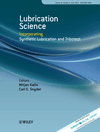
Lubrication Science
Scope & Guideline
Unlocking the potential of lubricants in engineering.
Introduction
Aims and Scopes
- Tribological Performance Evaluation:
The journal emphasizes the assessment of tribological performance across various systems, including bearings, gears, and other mechanical components, using experimental and computational methods. - Innovative Lubricant Formulations:
Research on the development and optimization of lubricants, including bio-based, nano-additive, and environmentally friendly formulations, is a core focus area. - Surface Engineering and Coatings:
The journal explores advanced surface engineering techniques, such as coatings and textures, to improve lubrication performance and reduce wear and friction. - Numerical and Experimental Studies:
A significant portion of the research published involves numerical simulations and experimental investigations to understand lubrication mechanisms under different operational conditions. - Sustainability and Green Lubrication Technologies:
Research addressing sustainability, including the use of biodegradable lubricants and the recycling of spent lubricants, is increasingly prominent in the journal.
Trending and Emerging
- Nanotechnology in Lubricants:
The integration of nanoparticles and nanostructured materials in lubricant formulations is gaining traction, with studies highlighting their effectiveness in enhancing tribological properties and reducing friction and wear. - Bio-Based and Sustainable Lubricants:
There is a notable increase in research focused on bio-based lubricants, reflecting a broader trend towards sustainability and the development of environmentally friendly lubrication solutions. - Advanced Computational Methods:
The use of advanced computational techniques, such as machine learning and molecular dynamics simulations, is emerging as a significant trend for predicting lubrication performance and optimizing lubricant formulations. - Multi-Functional Lubricants:
Research is increasingly focusing on multi-functional lubricants that not only reduce friction and wear but also provide additional benefits such as corrosion resistance and thermal stability. - Surface Modification Techniques:
Emerging studies on surface modification, including laser texturing and coatings, are becoming prevalent as researchers seek to optimize surface interactions and enhance lubrication performance.
Declining or Waning
- Conventional Mineral Oil Lubricants:
Research focused on traditional mineral oil lubricants has decreased as interest shifts towards bio-based and synthetic alternatives that offer better environmental and performance characteristics. - Static Lubrication Studies:
The emphasis on static lubrication mechanisms has waned, with more research directed towards dynamic and transient lubrication scenarios that better mimic real-world operating conditions. - Basic Wear Mechanisms:
While foundational studies on wear mechanisms remain relevant, there is a declining focus on basic wear analyses in favor of more complex and application-specific studies involving advanced materials and additives.
Similar Journals
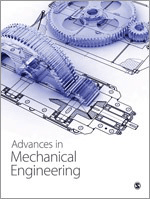
Advances in Mechanical Engineering
Exploring New Frontiers in Mechanical EngineeringAdvances in Mechanical Engineering is a premier open-access journal published by SAGE Publications Ltd, dedicated to the advancement of theoretical and applied research in the field of mechanical engineering. With an ISSN of 1687-8132 and an E-ISSN of 1687-8140, this journal has been a vital resource for scholars and practitioners since its inception in 2009. Housed in the United States, it operates under a commitment to ensure free and immediate access to its high-quality content, enhancing collaboration and innovation across the global engineering community. With a noteworthy Q2 ranking in the mechanical engineering category and a solid Scopus rank placing it in the 59th percentile, the journal serves as an influential platform for cutting-edge research, theoretical advancements, and comprehensive reviews. As the field evolves, Advances in Mechanical Engineering continues to cater to the rigorous needs of researchers, professionals, and students, striving to transform knowledge into tangible engineering solutions. This journal's commitment to excellence makes it a significant contributor to the mechanical engineering field, encouraging dynamic discussions and implications for the future.
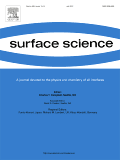
SURFACE SCIENCE
Innovating the Future of Materials ChemistrySURFACE SCIENCE is a prominent journal in the fields of Condensed Matter Physics, Materials Chemistry, and Surface Engineering, published by Elsevier in the Netherlands. With an ISSN of 0039-6028 and an E-ISSN of 1879-2758, the journal encompasses a wide range of research related to the physical and chemical properties of surfaces and interfaces, serving as a valuable resource for researchers, professionals, and students alike. As of 2023, it holds a Q3 ranking across multiple categories, indicating its significant contribution to its respective fields, despite room for improvement in its overall impact within the scientific community. Researchers will find that SURFACE SCIENCE provides a platform for innovative and interdisciplinary studies, making it essential for those looking to stay updated on emerging trends and technologies in surface science. While the journal is currently not open access, its reputation and robust indexing reinforce its importance in advancing scientific knowledge and fostering new discoveries.
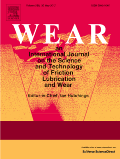
WEAR
Exploring the Dynamics of Wear and FrictionWEAR is a premier journal published by Elsevier Science SA, specializing in the field of materials science, particularly in the dynamics of wear and friction at the micro and nanoscale. Since its inception in 1957, this esteemed journal has evolved into a critical resource for researchers, professionals, and students alike, showcasing cutting-edge research and developments that significantly impact the disciplines of Condensed Matter Physics, Mechanics of Materials, Materials Chemistry, and Surfaces and Interfaces. With an impressive impact factor and consistently recognized as a Q1 category journal across various Scopus rankings, WEAR ranks in the top tiers of its field, underscoring its importance and influence within the academic community. The journal serves as a vital platform for disseminating innovative findings and applications, fostering scholarly dialogue, and advancing the understanding of material behaviors under wear and friction processes. For those keen on accessing the latest research in these dynamic areas, WEAR is an indispensable resource, promising a comprehensive collection of high-quality articles that reflect the forefront of scientific inquiry.

Journal of Friction and Wear
Unraveling the Secrets of Material PerformanceJournal of Friction and Wear, published by PLEIADES PUBLISHING INC, is a pivotal resource in the field of mechanical engineering, with a particular emphasis on the study of friction, wear mechanisms, and their implications in various materials. With an ISSN of 1068-3666 and an E-ISSN of 1934-9386, this journal provides a platform for cutting-edge research and reviews that contribute significantly to our understanding in these areas. Although currently classified under Q3 in both Mechanics of Materials and Surfaces, Coatings and Films, the journal is making strides towards higher rankings, reflecting its growing influence as it publishes comprehensive analyses and innovative findings. Researchers and professionals can access vital studies, offering insights into improving material durability and performance, integral to numerous industries. This journal serves as a key reference point for students and scholars alike, supporting their quest for knowledge in the evolving landscape of material science.
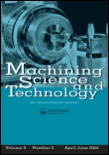
MACHINING SCIENCE AND TECHNOLOGY
Exploring the Intersection of Science and ManufacturingMACHINING SCIENCE AND TECHNOLOGY, published by Taylor & Francis Inc, is a leading academic journal that focuses on the multifaceted disciplines of machining and manufacturing processes, materials science, and mechanical engineering. With an established presence in the field since 1997 and a projection of continued relevance until 2024, this journal plays a critical role in disseminating cutting-edge research and innovative practices within these sectors. The journal holds a significant standing with a Q2 ranking in Industrial and Manufacturing Engineering, Materials Science, and Mechanical Engineering, reflecting its influential contributions to these fields. According to Scopus rankings, it positions itself in the top percentiles, showcasing its commitment to high-quality peer-reviewed publications. Researchers and professionals will find valuable insights and trends that cater to the ever-evolving landscape of machining technology and materials science, enriching their academic and practical endeavors.
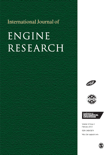
International Journal of Engine Research
Harnessing Research for Engineering BreakthroughsWelcome to the International Journal of Engine Research, an esteemed publication dedicated to advancing the fields of Aerospace Engineering, Automotive Engineering, Mechanical Engineering, and Ocean Engineering. Published by SAGE Publications Ltd and based in the United Kingdom, this journal has earned a prestigious reputation, consistently ranking in the Q1 quartile in several engineering categories as of 2023. The journal's impact is evident through its high Scopus rankings, positioning it within the top 25% of global research in Aerospace and Automotive engineering, and within the top 20% for Mechanical engineering. With a commitment to publishing rigorous, peer-reviewed research from 2000 to 2024, the International Journal of Engine Research plays a vital role in fostering innovation and collaboration within the engineering community. Although this journal does not offer open access, it remains a critical resource for researchers, industry professionals, and students striving to deepen their understanding in these dynamic fields.
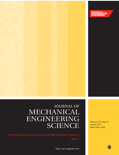
PROCEEDINGS OF THE INSTITUTION OF MECHANICAL ENGINEERS PART C-JOURNAL OF MECHANICAL ENGINEERING SCIENCE
Driving progress in mechanical engineering through shared knowledge.PROCEEDINGS OF THE INSTITUTION OF MECHANICAL ENGINEERS PART C - JOURNAL OF MECHANICAL ENGINEERING SCIENCE, published by SAGE Publications Ltd, stands as a pivotal resource in the field of mechanical engineering, encompassing a wide array of topics from advanced materials to fluid dynamics and system design. With an impact factor reflective of its esteemed reputation, as indicated by its Q2 ranking in the Mechanical Engineering category, this journal serves as a vital forum for researchers, practitioners, and students alike. The journal boasts a rich history, converging research from 1983 to 2024, showcasing innovations and advancements that shape the mechanical engineering landscape. Although it is not an open-access publication, the insights and studies published herein provide invaluable contributions to the engineering community, fostering knowledge exchange and collaborative advancements. Researchers seeking a platform for their pioneering work will find Part C an ideal venue to disseminate their findings and engage with peers in this dynamic field.
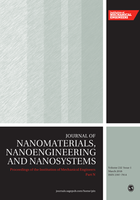
Proceedings of the Institution of Mechanical Engineers Part N-Journal of Nanomaterials Nanoengineering and Nanosystems
Pioneering Research in Nanomaterials for a Sustainable FutureProceedings of the Institution of Mechanical Engineers Part N - Journal of Nanomaterials Nanoengineering and Nanosystems is a premier journal published by SAGE Publications Ltd that focuses on advancing the field of nanotechnology through high-quality research and critical review articles. With an ISSN of 2397-7914 and an E-ISSN of 2397-7922, this journal serves as a vital platform for researchers and industry professionals exploring the interdisciplinary applications of nanomaterials and nanoengineering. The journal has achieved a significant standing in the academic community, reflected in its Q3 ranking across multiple categories including Condensed Matter Physics, Electrical and Electronic Engineering, and Materials Science for 2023, positioning it within the 75th percentile in relevant fields. Covering topics that range from fundamental research to practical applications, the journal aims to disseminate findings that push the boundaries of materials science and engineering. With open access options available, it ensures that groundbreaking research is accessible to a global audience. The proceedings are published from 2016 to 2024 and are vital for anyone involved in the rapidly evolving domain of nanoscience.
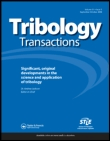
TRIBOLOGY TRANSACTIONS
Unlocking the Secrets of Material InteractionsTRIBOLOGY TRANSACTIONS is a leading journal published by Taylor & Francis Inc, serving as a crucial platform for researchers and practitioners in the fields of mechanical engineering, mechanics of materials, and surface science. With an ISSN of 1040-2004 and an E-ISSN of 1547-397X, this journal features pioneering research and comprehensive studies that span from 1988 to 2024, reflecting its longstanding commitment to advancing knowledge in tribology and its related disciplines. The journal holds a respectable Q2 ranking in its categories, with impressive scores in major databases, as indicated by its Scopus ranking. Although not an Open Access journal, its strategic focus on innovative tribological solutions makes it essential reading for anyone involved in material interactions, surface engineering, and related technologies. Researchers, professionals, and students alike will find valuable insights that drive advancements in these critical areas of study, reinforcing the journal’s position as a key resource in the academic and applied engineering communities.

International Journal of Surface Science and Engineering
Advancing Knowledge in Surface Science and EngineeringThe International Journal of Surface Science and Engineering, published by INDERSCIENCE ENTERPRISES LTD, serves as a vital platform for researchers and professionals in the field of mechanical engineering, surfaces, coatings, and materials science. With an ISSN of 1749-785X and an E-ISSN of 1749-7868, this journal disseminates innovative research addressing the challenges and advancements in surface technologies and engineering practices. Its scope includes, but is not limited to, surface coatings, interface properties, and novel material applications. Since its inception in 2007, the journal has established a solid reputation, achieving a Q3 ranking in Mechanical Engineering and Surfaces, Coatings and Films, and a Q4 ranking in Surfaces and Interfaces as of 2023. These metrics underscore the journal's growing influence, despite being positioned within the Q3 and Q4 quartiles of its categories. The International Journal of Surface Science and Engineering provides a curated collection of high-quality articles that contribute significantly to the understanding of surface phenomena, fostering collaboration and advancements in the field. Researchers, professionals, and students alike will find this journal an indispensable resource for cutting-edge developments and in-depth analyses.